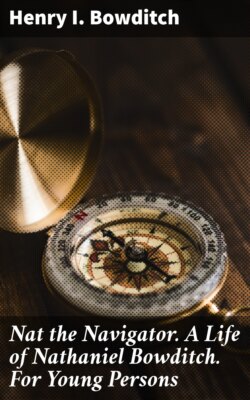Nat the Navigator. A Life of Nathaniel Bowditch. For Young Persons

Реклама. ООО «ЛитРес», ИНН: 7719571260.
Оглавление
Henry I. Bowditch. Nat the Navigator. A Life of Nathaniel Bowditch. For Young Persons
Nat the Navigator. A Life of Nathaniel Bowditch. For Young Persons
Table of Contents
NAT THE NAVIGATOR
CHAPTER I
CHAPTER II
CHAPTER III
CHAPTER IV
CHAPTER V
CHAPTER VI
CHAPTER VII
CHAPTER VIII
CHAPTER IX
CHAPTER X
CHAPTER XI
CHAPTER XII
Footnote
Отрывок из книги
Henry I. Bowditch
Published by Good Press, 2021
.....
CHAPTER XII.
At the age of seven years, and after returning to Salem, he went to a school kept by a man named Watson. Master Watson was one who had sufficient learning for those times; though the boys who now go to school in Boston would think it very strange if a master did not attempt to teach more than he did. None of the scholars had a dictionary. Master Watson was a good man, but he suffered much from headache, and therefore he was liable to violent fits of anger; and when thus excited, as it generally happens in such cases, he was guilty of injustice. An instance of this, young Bowditch met with, not long after he entered the school. From early life, Nat had liked ciphering, or arithmetic; and thinking that at school he would be able to learn something more about this than he had previously gained from his brothers, while at home, during the long winter evenings, he requested the master to allow him to study it. As he seemed too young, this request was not granted. But, being determined to study what pleased him so much, he obtained a letter from his father, in which Mr. Bowditch requested Master Watson to allow his son to pursue his favorite study. The schoolmaster, on receiving the message, was very angry, and said to his pupil, “Very well. I’ll give you a sum that will satisfy you;” and immediately prepared a question that he thought Nat would be unable to answer, and which he could not have answered had he not studied at home. But the boy had learned before sufficiently to enable him to perform the task; and, having done so, he ran gayly to the desk, expecting to be praised for his exact performance of duty. You may imagine his surprise at being saluted with these words: “You little rascal, who showed you how to do this sum? I shall punish you for attempting to deceive me.” The poor lad’s heart swelled and beat violently. He blushed and trembled from fear of punishment, but still more at the suspicion which his instructor had expressed, that he had been guilty of telling a lie. Filled with anger and alarm, he stammered out, “I did it, sir.” But his master would not believe him, and was about to strike him, when an elder brother interfered, and stated that Nat knew very well how to perform the task, for he himself had previously taught him enough to enable him to do it. Our young arithmetician thus escaped the punishment; but he never could forget that he had been accused of falsehood. His pious and truth-loving mother had so firmly fastened in his mind the holiness of truth, that he rarely, if ever, thought of deviating from it; and during his life he considered that any one who even suspected him of falsehood had done him the greatest injury. How well it would be if all of our boys loved truth as he did!
.....